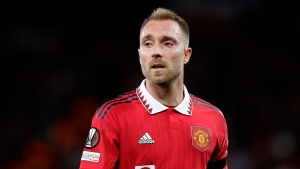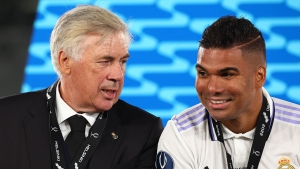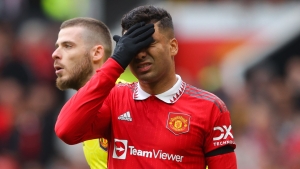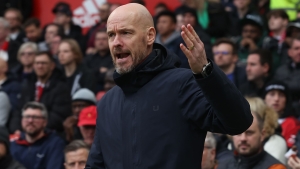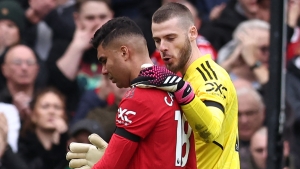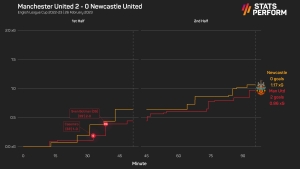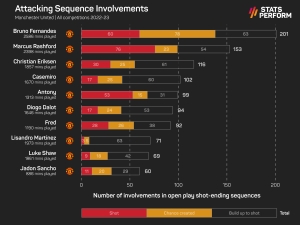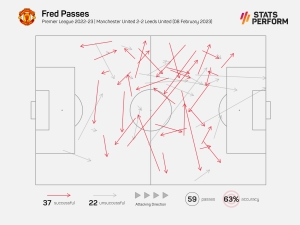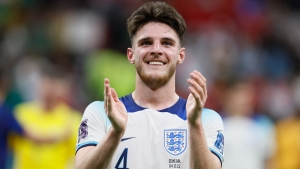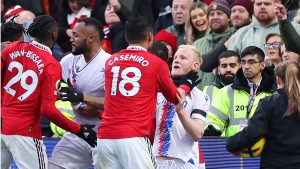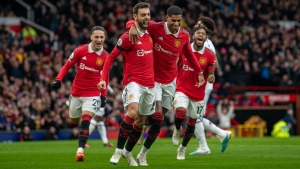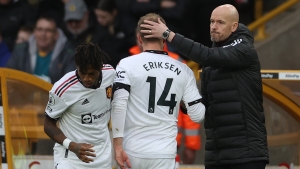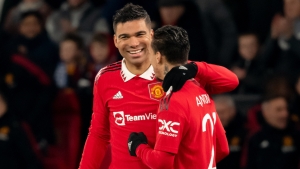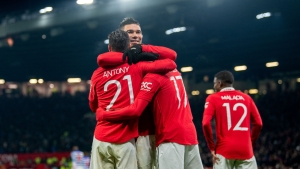When Alex Ferguson addressed Manchester United's fans at Old Trafford in 2013 asking them to support his chosen successor, David Moyes, few would have anticipated what the next decade would be like for the club.
In the final nine years of his near 27 in charge of United, Ferguson won five Premier League titles, three EFL Cups and the Champions League.
The nine seasons following his retirement brought the Red Devils just one FA Cup, one EFL Cup and the Europa League.
That Europa League success in 2017 was the last time United won a trophy of any kind, with a rare gap of six years without silverware for the club with the most league title wins in England.
However, Sunday gives them an opportunity to bring that drought to an end when they face Newcastle United in the EFL Cup final, and it could be the latest step on the impressive return to form overseen by Erik ten Hag since his arrival ahead of this season.
The Dutch coach was the eventual replacement for Ole Gunnar Solskjaer, with Ralf Rangnick's interim spell in between, but it's easy to forget how badly things started for Ten Hag.
United's first two games of the season saw them lose 2-1 at home to Brighton and Hove Albion before being thrashed 4-0 at Brentford.
Since then, Ten Hag's side have won 28 of their 37 games in all competitions, scoring 74 goals and conceding just 32, and overall they have a win percentage of 71.8.
Between Ferguson leaving and Ten Hag arriving, United have had Moyes, Louis van Gaal, Jose Mourinho and Solskjaer as permanent managers, none of whom had a win percentage as high after their first 39 games, with only Mourinho's above 60 per cent (61.5).
In fact, Ten Hag has already won more games than Moyes did in his entire 51 game spell (27).
Interestingly, Ten Hag's United have only scored a few more goals than Mourinho's did in his first 39 games (75-71), and have actually conceded more (38-30).
In terms of goal output, this United team has not outperformed previous ones across their first 39 games by all that much, with Moyes' side scoring 66 and conceding 39, Van Gaal's scoring 68 and conceding 38 and Solskjaer's scoring 58 and letting 43 in.
Ten Hag's side have clearly been more efficient in finding the goals to win games though, forcing those fine margins in their favour that are so often the difference between what is perceived to be success and failure at top clubs.
Statistically, the only noticeably significant difference in Ten Hag's United compared to his predecessors during their overall tenures at the club has come in the intensity of the team's pressing game.
Under the former Ajax boss, United have been winning possession in the final third at an average of 5.5 times per game, compared to Solskjaer's era when it was 4.2, Van Gaal's at 4.1, Mourinho's at 3.9 and Moyes at 2.7.
The trend was developing that way under Rangnick's brief interim spell at 4.7 times per game, but Ten Hag has taken it up another level again this season, making them look more like the aggressive high-octane United people remember under Ferguson.
The addition of Casemiro to the midfield has undoubtedly helped, with the Brazilian one of the best in the world at winning possession and putting pressure on opposition players.
He has produced all-round performances for United though since arriving from Real Madrid, with only Bruno Fernandes (201), Marcus Rashford (153) and Christian Eriksen (116) recording more than his 102 attacking sequence involvements, with all three having played more minutes than him.
In fact, the additions of Casemiro and Eriksen seem to have brought Fernandes back to the form he showed when he first joined from Sporting CP in January 2020.
It is Rashford, though, who has been the undoubted star of the season so far.
The England international scored just five goals in 32 games in 2021-22, but has hit 24 in 37 this season, already his most in a single campaign for United and including 17 goals at Old Trafford, the most at home by a player in a single season for the Red Devils since Wayne Rooney in 2011-12 (19).
United find themselves in a title race after recent stumbles by Arsenal and Manchester City, while also into the FA Cup fifth round and getting past Barcelona in the Europa League play-off round.
The fans are onside again with prospect of new ownership possibly also round the corner, and there generally seems to be a genuine feel-good factor that has been missing outside of some false dawns in recent years.
When Ferguson spoke to the fans in 2013, it would have been hard to imagine a possible EFL Cup win being seen as such a potentially significant moment for such a proud club, but United fans know as well as anyone that one trophy can often lead to more.
Ten Hag said as much at his press conference on Friday, stating: "I see [the season] so far not as a success. It's more the road to hopefully success. It's only success when you win trophies, but on Sunday we have an opportunity to get success."
It did not prove to be a sign of things to come for Van Gaal, who was sacked after winning the FA Cup, or for Mourinho, who could not follow up his EFL Cup and Europa League double.
It feels like there's more substance to this United revival though, and there are few better ways to cement that than by ending their trophy drought at Wembley on Sunday.























